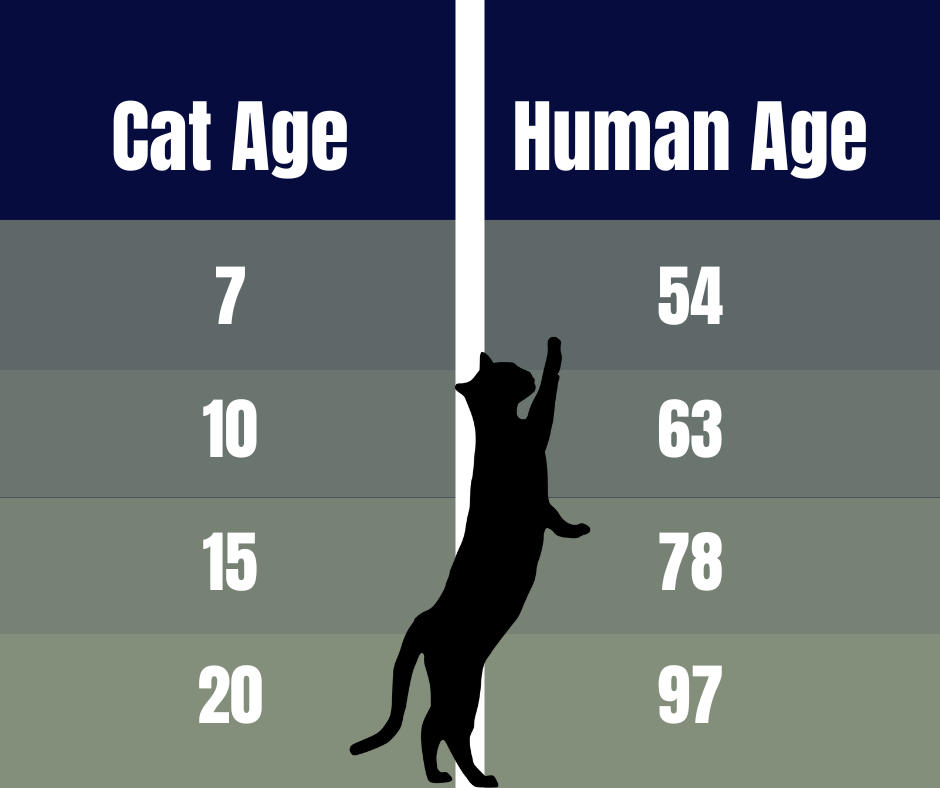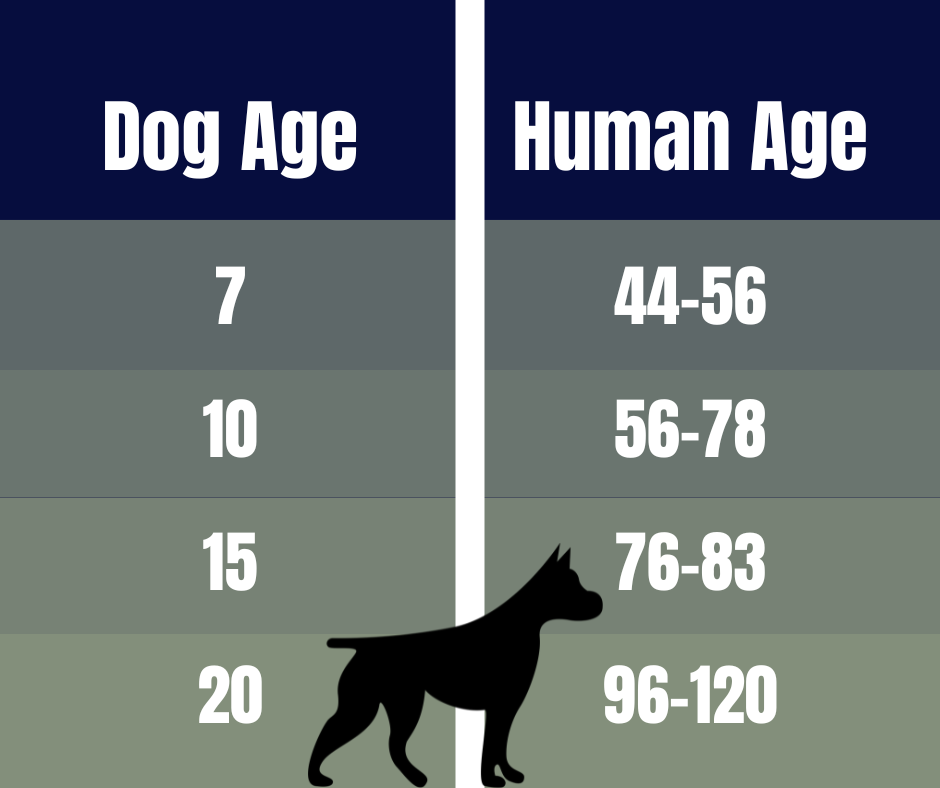Pets today have an increased life expectancy due to the advances in veterinary medicine, nutrition, heartworm testing and prevention, and improved care provided by more informed owners. As your pet ages, they are more at risk for developing diabetes, heart disease, arthritis, cancer, and dental disease. For this reason, we strongly recommend early screening and preventative care if you have a senior companion.
When Does a Dog or Cat become a Senior Pet?
Many factors affect how quickly cats and dogs age such as their breed, size, and environment. However, the general rule of thumb states that cats and dogs are considered seniors by the age of seven.
Cats and small dogs are considered seniors by the age of seven.
Larger breed dogs tend to have shorter life spans and are considered senior when they are about 6 years of age.
If you are curious how your pet’s years compare to human years, you can check out the AVMA charts below:


Diseases That Can Develop as Your Pet Ages
As your pet ages, they undergo physical changes, as you see in older people. They typically will have some loss of sight, and hearing, some incontinence, and an inability to get around like they used to. Senior pets are more prone to develop diseases such as:
-
Cancer
-
Heart Disease
-
Kidney/Urinary Tract Disease
-
Liver Disease
-
Diabetes
-
Arthritis
-
Senility
Six Tips for Helping Your Pet as They Age
1. Senior Screening.
While we always recommend regular screenings each year, senior screenings start at age seven. An annual exam and diagnostic testing detect early changes in your pet’s organ function. Pets can’t talk, so test results give pets a voice. It helps us provide longer, healthier, happier lives for pets! During the screening, our doctors check from nose to tail. The following diagnostic tests may be ordered:
Diagnostic Tests
-
Blood work: A blood chemistry profile includes electrolytes and provides information about your pet’s liver, kidneys, and pancreas, as well as other body functions, such as blood sugar and hydration. A complete blood count (CBC) can identify infection, inflammation, and anemia.
-
Fecal Test – Check for intestinal parasites, which may live in your pet’s gastrointestinal tract. The only way to detect the presence of most intestinal parasites and identify them is by doing a fecal test. Many pets with parasite will appear normal and their stools will appear normal as well.
-
Thyroid Function Test – A thyroid function test detects whether your pet’s thyroid gland is functioning properly. Thyroid disease is prevalent in older cats and dogs.
-
Cardiac Disease Screening – Check for evidence of early, underlying heart disease. It allows us to detect and treat heart disease sooner, slowing its progression.
-
Urinalysis – Routine test that reports the physical and chemical properties of urine. It is used mainly to assess the health of the kidneys and urinary system, but it also reveals problems in other organ systems, and is important for diagnosing metabolic disease such as diabetes mellitus.
2. Monitor Their Weight.
According to the AVMA, weight can tremendously affect an older pet’s health. Obesity in older pets increases the risk of arthritis, difficulty breathing, insulin resistance or diabetes, heart disease, high blood pressure, skin problems, cancer, and other conditions.
Sudden weight loss in an older pet is also a concern, especially for cats. An overactive thyroid gland), diabetes, and kidney disease are common causes of weight loss in senior cats. Contact us if you notice sudden changes in your older pet’s weight.
3. Keep Them Active.
Whatever physical activity they can manage, keep them at it. Adjust their exercise to their abilities. They may have once been able to go on runs with you but now may only be able to tolerate a slower or shorter walk. Multiple short walks a day can be just as good for a senior pet as a long walk. Often arthritic pets will tolerate multiple short walks much better than a longer walk. Set a goal of at least 30 minutes of exercise a day.
4. Keep their Teeth and Gums Healthy.
Dental disease is the number one problem in dogs and cats. Foul-smelling breath and discolored teeth are signs of dental disease. Dental disease can become very painful for your pet, contribute to heart and respiratory disease, and affect other organs.
Our dental services include teeth cleaning and polishing, tooth extractions and minor oral surgery. Our team of skilled vets are on site to perform any variety of dental services to your dog or cat. If required, we do offer full assessments before administering anesthetics.
5. Help Them with Grooming.
As pets age, it can become difficult for them to groom themselves properly, so you may need to help them with their grooming more frequently. This will help keep their coats healthy and it is a great way to give them some love and attention too.
6. Adjust Their Environment as Needed.
You may need to make some environmental adjustments as your pet cannot see, hear, or move as well as they used to. Here are some possibilities:
-
Get them a pet stair or ramp. If your pet is used to getting up on your bed or couch to snuggle, a pet stair or ramp can help them manage. Stairs can also help dogs get in and out of your car.
-
Make Their Environment Safe. Always keep dogs on a leash when they are outdoors. Keep your cat in a secured patio (catio), porch, or indoors. There are also cat fences, such as The Purrfect Fence, to keep them safe in your yard.
-
Provide them with a comfortable bed. An orthopedic or heated bed could make a big difference in their sleeping comfortably and relieving arthritic pain.
Final Words
Many of the diseases senior pets can suffer from can go unnoticed in the early stages. Early screening and preventative health care become critical in prolonging your companion’s life. Together we can help your pets live longer, healthier lives. Please don’t hesitate to contact us if you have any questions or need to schedule a visit.
Sincerely,
Dr. Ashley Tuma
Pine Creek Animal Hospital



0 Comments